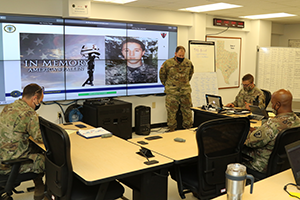Story and photos by Staff Sgt. D. Michael Giles, 36th Infantry Division Public Affairs
CAMP MABRY, Texas—Wade Slack was once a kid who loved hunting and video games. He was devoted to his family. And, he dreamed of becoming a Soldier.
As he approached adulthood, he quickly realized his dream, enlisting in the Army months prior to his graduation from high school. Wade died shortly after his 21st birthday, in the line of duty on May 6, 2010, at Forward Operating Base Shank, Afghanistan, of wounds sustained when insurgents attacked his unit.
His younger brother, Andrew Slack, recalled how the news of his death put an end to his own childhood, forcing him to face adult realities.
“I had been up to no good, doing my own thing,” he said. “I didn’t really think anything of the military. It didn’t really occur to me that people die overseas every day.”
“It was a stern reality check when we had those government employees show up at my mom’s house,” Andrew said.
 Soldiers with Joint Task Force 176—Col. Robert Crockem, commander; Maj. Peter Ammerman, operations offier; Capt. Brett Anderson, chaplain; and 1st Lt. Andrew Slack, liaison officer—honor Slack's brother, Spc. Wade Slack, on the tenth anniversary of his death at Camp Mabry in Austin, Texas, May 6, 2020. (U.S. Army National Guard Photo by Staff Sgt. Michael Giles, 36th Infantry Division Public Affairs)
Soldiers with Joint Task Force 176—Col. Robert Crockem, commander; Maj. Peter Ammerman, operations offier; Capt. Brett Anderson, chaplain; and 1st Lt. Andrew Slack, liaison officer—honor Slack's brother, Spc. Wade Slack, on the tenth anniversary of his death at Camp Mabry in Austin, Texas, May 6, 2020. (U.S. Army National Guard Photo by Staff Sgt. Michael Giles, 36th Infantry Division Public Affairs)
Things didn’t get easier for Andrew or his family through the years that followed. His father, a Veterinarian much beloved by the local community in Waterville, Maine, died of a heart attack a year and a half later. Before another two years had passed, one of his sisters, who was struggling with alcohol and drug addiction, took her own life.
“Today is a culmination of what the circumstances of my young adult life produced,” Andrew said on May 6, 2020, the 10th anniversary of his brother’s death.
Now a first lieutenant in the Texas Army National Guard, a platoon leader in the 111th Engineer Battalion, and a liaison officer for Joint Task Force 176’s COVID-19 response mission, Andrew reflects on how these tragic events shaped his values and beliefs about Soldiering and leadership.
“As terrible as that was to accept in the beginning, as well as the deaths that followed within my family within the next four years, it puts things into the perspective of not taking things for granted, and not wasting time,” said Andrew, who applied this lesson to his work during the COVID-19 pandemic.
As he was preparing to take on the role, he heard through the grapevine that liaison officers tend to feel useless, only answering phones day in and day out.
Regardless of whether that may have been true for anyone who had held a similar position in the past, Andrew seized the opportunity to develop himself and contribute significantly to the mission.
“I looked around at the collective knowledge in the room, realizing how much I didn’t know, and realized that you’re only useless if you don’t take advantage of a situation,” said Andrew, explaining that his eagerness to learn led to increased opportunity and responsibility. “I quickly went from dialing in phones, to successfully emulating the battle captain position, to being assigned in mission analysis of 176th Task Force construction objectives.”
Andrew’s insistence in seizing all the opportunities in his role aligns with the philosophy his brother demonstrated with his actions, to “Love what you do, and do it to its fullest.”
His brother had enlisted in the Army with the goal of disposing of explosives intended to kill service members or local civilians. Despite the obvious dangers involved in this profession, Wade had his heart set, and after basic training, he completed the 37-week explosive ordnance disposal (EOD) training that is challenging enough to wash out 75 percent of the class.
“He knew what he wanted to do,” Andrew said. “He executed just that to EOD standard.”
On the tenth anniversary of his death Joint Task Force 176 finished the daily brief with silence and reverent words about Spc. Wade Slack. Col. Robert Crockem, the task force’s commander, said remembering fallen Soldiers can help us stay careful and not become complacent.
“We have to be aware of what we’re doing at all times, and not take for granted that things are always going to work out,” Crockem said. “It brings a sobering reality to the fact that we’re in the military, and the military can be a dangerous business.”